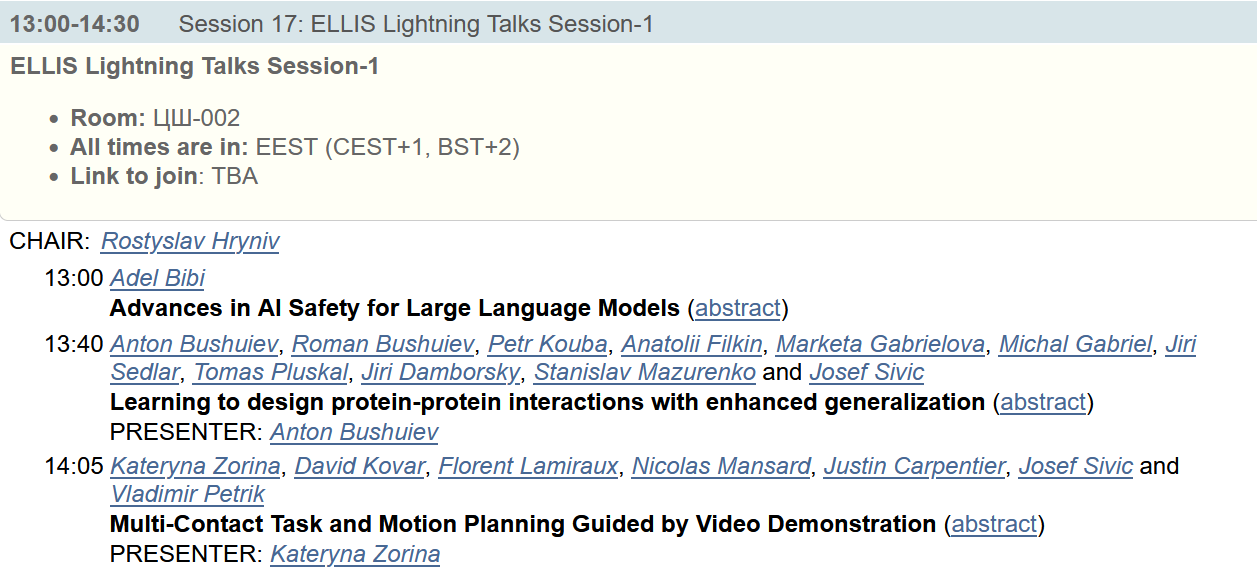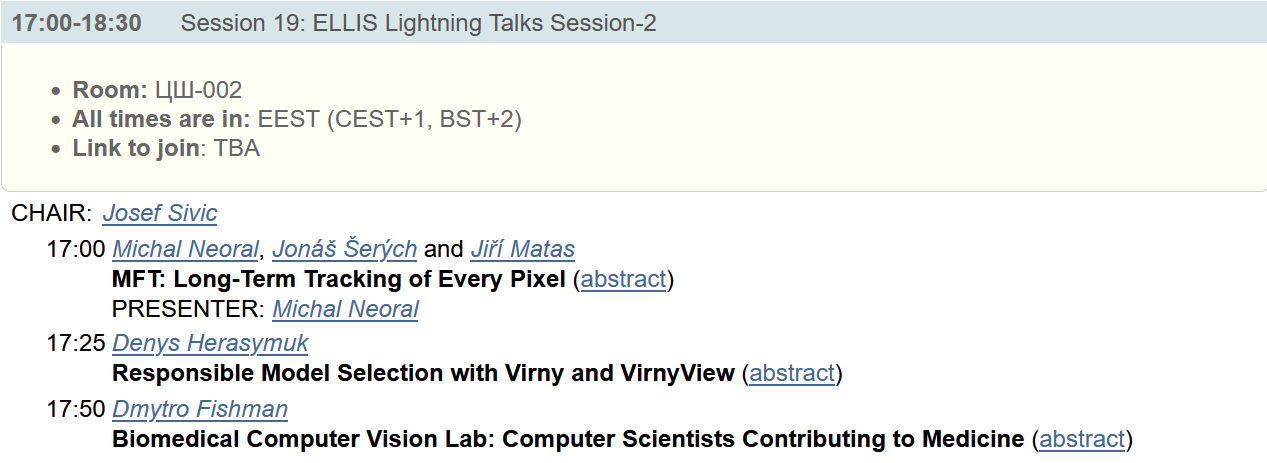This page presents the Program for ELLIS Lightning Talks at ICTERI-2024. The track is organized by:
- ELLIS Unit Prague (https://ellis.eu/units/prague)
- ELLIS Associate Unit Lviv (https://ellis.eu/units/lviv)
ELLIS and Lightning Talks
ELLIS (https://ellis.eu/) – the European Laboratory for Learning and Intelligent Systems – is a pan-European AI network of excellence, which focuses on fundamental science, technical innovation, and societal impact. Founded in 2018, ELLIS builds upon machine learning as the driver for modern AI and aims to secure Europe’s sovereignity in this competitive field by creating a multi-centric AI research laboratory. ELLIS wants to ensure that the highest level of AI research is performed in the open societies of Europe, and follows a three-pillar strategy to achieve that.
There is a nice practice, supported by ICTERI and ELLIS, that the authors of recent papers, published at top-tier conferences, are invited to present their contributions. At ICTERI-2024, we offer this dissemination channel to the speakers and our community. For that, we have selected six lightning talks that are outlined below.
The information about the dates and times of the two ELLIS Lightning Talks Sessions at ICTERI-2024 is provided at the conference program. We also provide it here for your convenience.
ELLIS Lightning Talks Track Chairs

Josef Sivic (CVUT, Prague)

Rostyslav Hryniv (UCU, Lviv)



Speaker: Adel Bibi, University of Oxford, https://www.adelbibi.com/
Title: Advances in AI Safety for Large Language Models
Date: September the 25th. Time: 13:00 EEST
Abstract: We delve into our research on AI safety, focusing on advancements aimed at ensuring the robustness, alignment, and fairness of large language models (LLMs). The talk will start with an exploration of the challenges posed by sensitivity in AI systems and strategies for providing provable guarantees against worst-case adversaries. Building upon this, we navigate through the alignment challenges and safety considerations of LLMs, addressing both their limitations and capabilities, particularly following techniques related to instruction prefix tuning and their theoretical limitations towards alignment. At last, I will talk about fairness across languages in common tokenizers in LLMs.
The talk will be based on these three papers
- Aleksandar Petrov, Emanuele La Malfa, Philip H.S. Torr, and Adel Bibi: Language Model Tokenizers Introduce Unfairness Between Languages (NeurIPS23)
- Aleksandar Petrov, Philip H.S. Torr, and Adel Bibi: When do prompting and prefix-tuning work? a theory of capabilities and limitations (ICLR24)
- Aleksandar Petrov, Philip H.S. Torr, and Adel Bibi: Prompting a pretrained transformer can be a universal approximator (ICML24)

Speaker: Anton Bushuiev, Czech Technical University in Prague, https://www.linkedin.com/in/anton-bushuiev/
Title: Learning to design protein-protein interactions with enhanced generalization
Date: September the 25th. Time: 13:40 EEST
Abstract: Discovering mutations enhancing protein-protein interactions (PPIs) is critical for advancing biomedical research and developing improved therapeutics. While machine learning approaches have substantially advanced the field, they often struggle to generalize beyond training data in practical scenarios. The contributions of this work are three-fold. First, we construct PPIRef, the largest and non-redundant dataset of 3D protein-protein interactions, enabling effective large-scale learning. Second, we leverage the PPIRef dataset to pre-train PPIformer, a new SE(3)-equivariant model generalizing across diverse protein-binder variants. We fine-tune PPIformer to predict effects of mutations on protein-protein interactions via a thermodynamically motivated adjustment of the pre-training loss function. Finally, we demonstrate the enhanced generalization of our new PPIformer approach by outperforming other state-of-the-art methods on new, non-leaking splits of standard labeled PPI mutational data and independent case studies optimizing a human antibody against SARS-CoV-2 and increasing the thrombolytic activity of staphylokinase.
The talk will be based on the paper
- Anton Bushuiev, Roman Bushuiev, Petr Kouba, Anatolii Filkin, Marketa Gabrielova, Michal Gabriel, Jiri Sedlar, Tomas Pluskal, Jiri Damborsky, Stanislav Mazurenko, and Josef Sivic: Learning to design protein-protein interactions with enhanced generalization (ICLR 2024)

Speaker: Kateryna Zorina, Czech Technical University in Prague, https://www.linkedin.com/in/kateryna-zorina/
Title: Multi-Contact Task and Motion Planning Guided by Video Demonstration
Date: September the 25th. Time: 14:05 EEST
Abstract: Discovering mutations enhancing protein-protein interactions (PPIs) is critical for advancing biomedical research and developing improved therapeutics. While machine learning approaches have substantially advanced the field, they often struggle to generalize beyond training data in practical scenarios. The contributions of this work are three-fold. First, we construct PPIRef, the largest and non-redundant dataset of 3D protein-protein interactions, enabling effective large-scale learning. Second, we leverage the PPIRef dataset to pre-train PPIformer, a new SE(3)-equivariant model generalizing across diverse protein-binder variants. We fine-tune PPIformer to predict effects of mutations on protein-protein interactions via a thermodynamically motivated adjustment of the pre-training loss function. Finally, we demonstrate the enhanced generalization of our new PPIformer approach by outperforming other state-of-the-art methods on new, non-leaking splits of standard labeled PPI mutational data and independent case studies optimizing a human antibody against SARS-CoV-2 and increasing the thrombolytic activity of staphylokinase.
The talk will be based on the paper
- Kateryna Zorina, David Kovar, Florent Lamiraux, Nicolas Mansard, Justin Carpentier, Josef Sivic, and Vladimir Petrik: Multi-Contact Task and Motion Planning Guided by Video Demonstration (ICRA 2023)

Speaker: Michal Neoral, Czech Technical University in Prague, https://www.researchgate.net/profile/Michal-Neoral
Title: MFT: Long-Term Tracking of Every Pixel
Date: September the 25th. Time: 17:00 EEST
Abstract: We propose MFT — Multi-Flow dense Tracker — a novel method for dense, pixel-level, long-term tracking. The approach exploits optical flows estimated not only between consecutive frames, but also for pairs of frames at logarithmically spaced intervals. It selects the most reliable sequence of flows on the basis of estimates of its geometric accuracy and the probability of occlusion, both provided by a pre-trained CNN. We show that MFT achieves competitive performance on the TAP-Vid benchmark, outperforming baselines by a significant margin, and tracking densely orders of magnitude faster than the state-of-the-art point-tracking methods. The method is insensitive to medium-length occlusions and it is robustified by estimating flow with respect to the reference frame, which reduces drift.
The talk is based on the paper
- Michal Neoral, Jonáš Šerých, and Jiří Matas: MFT: Long-Term Tracking of Every Pixel (WACV-24)

Speaker: Denys Herasymuk, Ukrainian Catholic University, https://www.linkedin.com/in/denys-herasymuk/
Title: Responsible Model Selection with Virny and VirnyView
Date: September the 25th. Time: 17:25 EEST
Abstract: Machine Learning (ML) models are being used to make decisions in increasingly critical domains. To determine whether models are production-ready, they must be comprehensively evaluated on a number of performance dimensions. Since measuring only accuracy and fairness is not enough for building robust ML systems, each model involves at least three overall dimensions (correctness, stability, uncertainty) and three disparity dimensions evaluated on subgroups of interest (error disparity, stability disparity, uncertainty disparity). Adding to the complexity, these model dimensions exhibit trade-offs with one another. Considering the multitude of model types, performance dimensions, and trade-offs, model developers face the challenge of responsible model selection.
In this paper, we present a comprehensive software library for model auditing and responsible model selection, called Virny, along with an interactive tool called VirnyView. Our library is modular and extensible, it implements a rich set of performance and fairness metrics, including novel metrics that quantify and compare model stability and uncertainty, and enables performance analysis based on multiple sensitive attributes, and their intersections. The Virny library and the VirnyView tool are available at https://github.com/DataResponsibly/Virny and https://r-ai.co/VirnyView.
The talk will be based on the paper
- Denys Herasymuk, Falaah Arif Khan, and Julia Stoyanovich: Responsible Model Selection with Virny and VirnyView (SIGMOD/PODS ’24: Companion of the 2024 International Conference on Management of Data)

Speaker: Dmytro Fishman, University of Tartu, http://biit.cs.ut.ee
Title: Biomedical Computer Vision Lab: Computer Scientists Contributing to Medicine
Date: September the 25th. Time: 17:50 EEST
Abstract: This talk will cover research at the forefront of biomedical imaging data analysis, leveraging machine learning and deep learning to create state-of-the-art software solutions for diverse biomedical imaging modalities. Collaborating with academic institutions, private companies, and hospitals, we address a wide range of biomedical challenges. Our partnerships with Revvity have led to breakthroughs in microscopy image analysis, including a pioneering AI model for brightfield microscopy. In histopathology, our work with Estonian hospitals aims to automate and expedite pathology workflows, improving diagnostic accuracy and patient outcomes. Additionally, our AI research in medical imaging, in collaboration with a MedTech startup – Better Medicine, focuses on developing the General Purpose Medical AI (GPAI) system, which uses weakly supervised models to streamline radiological workflows and reduce the burden on radiologists. Our efforts are particularly impactful in Estonia, a nation with progressive digitalization policies and centralized electronic health records, as we advance the digital transformation of healthcare, ultimately improving patient care and accelerating therapeutic discoveries through innovative AI-driven analysis.
The talk will be based on these papers
- Dmytro Shvetsov, Joonas Ariva, Marharyta Domnich, Raul Vicente, and Dmytro Fishman: Counterfactual inpainting for weakly supervised semantic segmentation for medical images (XAI-2024)
- Iaroslav Plutenko, Mikhail Papkov, Kaupo Palo, Leopold Parts, and Dmytro Fishman: Metadata Improves Segmentation Through Multitasking Elicitation (DART 2023)